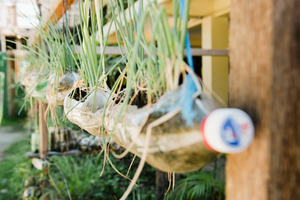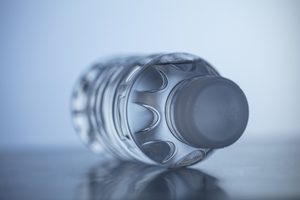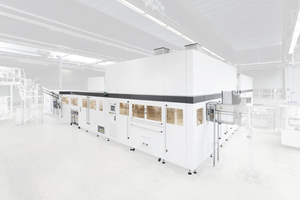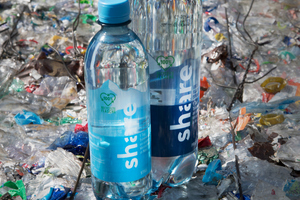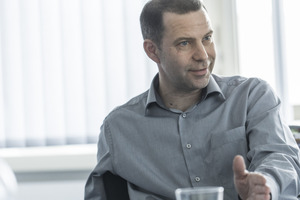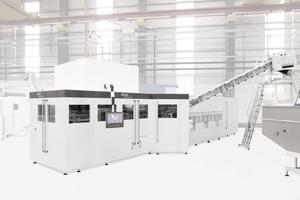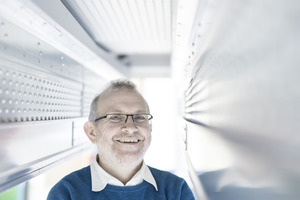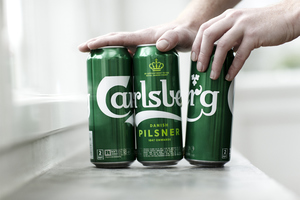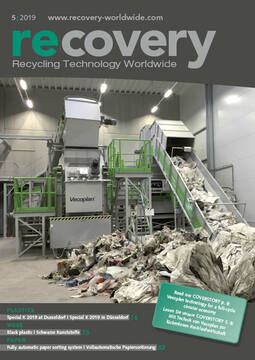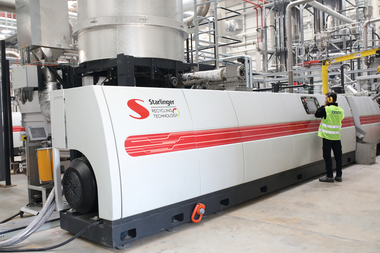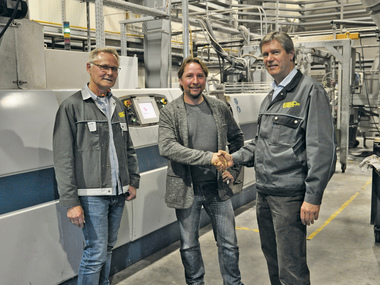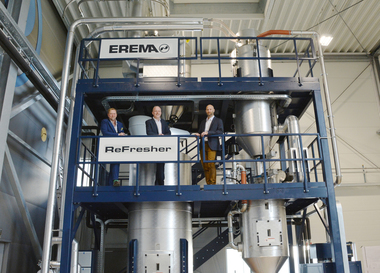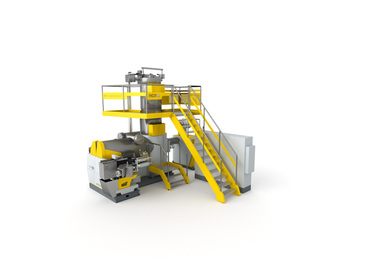KHS faces the challenges of sustainable packaging and even now offers market-proven solutions
KHS has been the partner of the beverages industry for some 150 years, and knows its needs. The subject of sustainability has not only now begun to stir the industry. The concerns, on the one hand, are climate targets and, more specifically, the continuous reduction of the CO2 footprint in beverages production via the development and use of ever more energy- and resources-efficient plants. And, on the other hand, the importance of innovative packaging solutions, from which beverage producers and consumers profit equally, is also growing. The road to ever more sustainable primary and secondary packaging is, in this context, pursuing two essential strategies: recycling and reduction. Packaging material is to be kept in circulation as continuously as possible, by means of its recovery, reprocessing and constant reuse. Above and beyond this, work is going on in many diverse forms in order to use less and less packaging material, and in order to conserve resources and avoid waste. KHS is pursuing both of these aims and offers practicable solutions.
FreshSafe-PET®: The only totally
recyclable barrier solution
An important step on the path to a smoothly functioning, efficient and thus sustainable circular economy is that of improving the recyclability of PET bottles in such a way that they can be routed to bottle-to-bottle recycling. Juice bottles, in particular, in many cases contain multilayer, blend or scavenger additives. These are intended to protect sensitive beverages against external influences, such as the ingress of oxygen. These additives in the preforms also prevent pure-fraction reprocessing, and thus utilisation in complete bottle-to-bottle recycling, however. In FreshSafe-PET® – a patented plasma-coating procedure – KHS currently offers the only recognised, fully recyclable barrier solution for the globally significant increase of recycling rates of PET beverage packaging, combined with enhanced product protection. This is confirmed by several recycling associations, such as the EPBP1 and the APR2. In this process, an ultra-thin protective layer consisting of silicon oxide (SiOx), i.e., chemically pure glass, is applied to the inner wall of the PET container. This technology replaces the additives otherwise necessary. It protects sensitive products, such as fruit juices and nectars, against the ingress of oxygen and other substances. The additional loss of CO2 from carbonated beverages is also significantly reduced. The flavour is preserved, shelf-life is prolonged, and complete recyclability made possible.
Disposable PET bottles are, in principle, completely recyclable. Juice and fruit nectar bottles nowadays predominantly do not consist of pure PET, however. In many cases, they contain so-called multilayer, blend or scavenger materials, which protect sensitive beverages against external influences, such as the ingress of oxygen. The composition of these PET bottles prevents pure-fraction further processing together with PET bottles to which the refundable deposit applies, and are thus subject to higher-level recycling. „A quarter of the clear rPET flakes from the yellow bag contain scavengers, and therefore impair the quality, due to a yellowish coloration, for example,“ states Herbert Snell, CEO of the MultiPet GmbH recycling organisation. „Mixing of these PET bottles with other beverage bottles consisting of PET complicates the use of these rPET flakes for bottle-to-bottle recycling to an extraordinary extent.“
For this reason, they cannot currently be included in the German system of deposits on disposable packaging, Snell comments. According to a recent study by the Gesellschaft für Verpackungsmarktforschung (Packaging Market Research Corporation, GVM), around 10 % of all PET non-returnable bottles carry no deposit, and 38 000 t of PET material thus eludes the deposit cycle. The major portion of these bottles is used nowadays for packing of juices and fruit nectars. Should manufacturers in this beverages segment fail to optimise their packaging portfolio to approach complete recyclability, they will also be threatened with high additional penalties in the trade in conventional PET bottles with additives.
Investments in barrier technology do, it is true, cause additional costs for manufacturers. Thanks to falling overall costs in operation, however, this expenditure is recovered comparatively quickly. Juice and fruit nectar producers can, for example, change to lower-cost standard PET preforms, eliminating ties to specific preform producers. In addition, FreshSafe-PET® provides a significantly improved barrier quality compared to conventional composite materials and assures a notably longer shelf-life. Thanks to complete recyclability, PET bottles will, in future, receive preferential treatment in calculation of the participation fees.
KHS provides beverage manufacturers with an individual overall-cost analysis for the use of this barrier technology. „Measured against the great benefit resulting, in particular, from additional product protection and longer product shelf-lives, costs per bottle are, in fact, actually lower,“ affirms Philipp Langhammer, Product Manager, Barrier Technology at KHS Corpoplast. „Compared to the potential additional costs for the use of difficult-to-recycle PET bottles, resulting from the new Packaging Act, beverage producers should now put their packaging portfolio on a future-safe basis and thus also make a contribution toward a sustainable packaging solution.“
PET container solutions from recyclate
increasingly in demand
Another possibility of further improving the ecological balance is the raising of the recyclate content up to a 100 % proportion of so-called rPET in PET containers. KHS offer solutions for this option. In cooperation with bottler Mineralbrunnen Allgäuer Alpenwasser, the preform producer Plastipack and the Berlin start-up share, this system supplier has, for example, developed and successfully market-launched a 0.5 litre and a 1.0 litre PET bottle consisting 100 % of recyclate. „It is perfectly possible to produce a PET bottle consisting 100 % of recycled PET, but the challenges are in the detail. A differentiated view is necessary here,“ states Arne Wiese, Product Manager, Bottles & ShapesTM at KHS Corpoplast in Hamburg. „Chemically recycled PET permits qualities that are absolutely equivalent to those of virgin PET. There are no restrictions here.“ The rPET used on the market is generally a PET purified under vacuum conditions, however. „Qualities fluctuate here, depending on the production process,“ Wiese continues. The quality of the rPET does have implications for bottle robustness and weight, however. This means: the poorer the quality of the recyclate, the more robust the bottle must be. This can be achieved either with higher weight or via the optimisation of the preform. „If a bottle is so light that it only just meets the robustness criteria, inferior recyclate quality will then mean that it will just no longer conform to the specifications“, Wiese adds. In addition, rPET is currently not available in adequate quantities and in the necessary quality. In Germany, it is true, the largest individual fraction (32.6 %) is routed to bottle-to-bottle recycling, but the remainder, of over 65 %, is forwarded, above all, to the films and the textile industries. Around the world, furthermore, there is very largely a lack of such a pure-fraction collecting system.
Bottles & Shapes™ as an overall concept
The effects on the robustness and weight of the bottle caused by the use of differing amounts and differing qualities of recyclate are accepted, however, in order to achieve a positive effect on the ecological balance. The holistic Bottles & ShapesTM advisory service provides, on the basis of design criteria and material qualities, mass-producible, machine-fillable bottle solutions which bring cost and sustainability aspects, marketing criteria and user convenience into the correct balance. „This means a whole lot of know-how, which we possess thanks to our decades of experience,“ notes Wiese. In addition, KHS‘s stretch blowing machines are optimised in such a way that they can process preforms containing up to 100 % recyclate or, alternatively, containing biopolymers3, i.e., regenerative input materials. „The relevance of these will increase significantly in the future. For this purpose, we have created the technical preconditions for the boosting of value creation throughout the line, with simultaneous savings on resources – in the case, for example, of the new generation of stretch blowing machines of the InnoPET-Blomax Series V,“ Wiese affirms.
Secondary packaging offers high potential for savings
At the KHS Competence Center for secondary packaging solutions at the company‘s Kleve location, work has long been ongoing on alternatives to the classical shrink film. Many of these necessitate extensive test procedures on the machines. „The greatest challenge facing us is the workability of the packaging materials,“ emphasises Karl-Heinz Klumpe, Product Manager, Packaging at KHS. „Shrink film produced from recycled plastics exhibits a totally different shrinkage behaviour compared to film from new material. We, as machine manufacturers, cannot alone provide an answer to this, we must, instead, coordinate closely with the film producers.“ KHS organises workshops with these partners for this purpose. These explore how the recyclate content of films – as required in Germany, in the new Packaging Act, for example – can be increased even further. Changes to the chemistry or the formulation of the films, with a simultaneous modification of the machine technology, would be necessary, inter alia. „The fundamental condition will be a qualitative standard that will be accepted by the people responsible for marketing at the major bottlers. The shrinkage results when using 100 % recyclate films are not yet satisfactory. We intend here to continue intensifying development together, in order to reconcile the contradictions between rising recycling requirements, on the one hand, and the call for ever higher package quality on the other,“ states Klumpe.
Nature MultiPackTM – a unique packaging solution
Even now, KHS, following the development of its Nature MultiPackTM, has a film-free packaging in its range. This reduced form of secondary packaging actually makes conventional shrink films totally superfluous in the case of multipacks. PET bottles and cans are then held together only by secure but easily detachable spots of adhesive. Only a self-adhesive carrying handle is thus then necessary for transportation. The adhesive spots themselves do not in any way impair the properties of the material destined for recycling, since the adhesive is removed without difficulty during the recycling process. The Nature MultiPack™ was introduced to the market as a six-pack for cans under the „Snap Pack“ name by the Carlsberg Group in 2018. Danone Waters used this packaging solution as early as 2016 for the market launch of its so-called „Prestige“ PET bottle for Evian. Plastic waste is in this way completely avoided, because there is now no need to dispose of any film packaging material.
„The ongoing debate around the subject of packaging waste has undoubtedly further heightened awareness of environmentally safe packaging solutions,“ Klumpe affirms. KHS now offers, in very many respects, a large range of market-proven solutions, which, particularly in the field of PET containers and secondary packaging, tangibly and demonstrably support our customers‘ efforts to attain sustainability. „We all take the public discussion very seriously, and are working directly with all the companies involved on further developments aimed at putting an end to the pollution of the environment with plastics as effectively as possible, with the assistance of our know-how and our capabilities,“ Klumpe emphasises. „Ultimately, all of us are consumers, and we also bear unequivocal responsibility for our own personal behaviour.“

